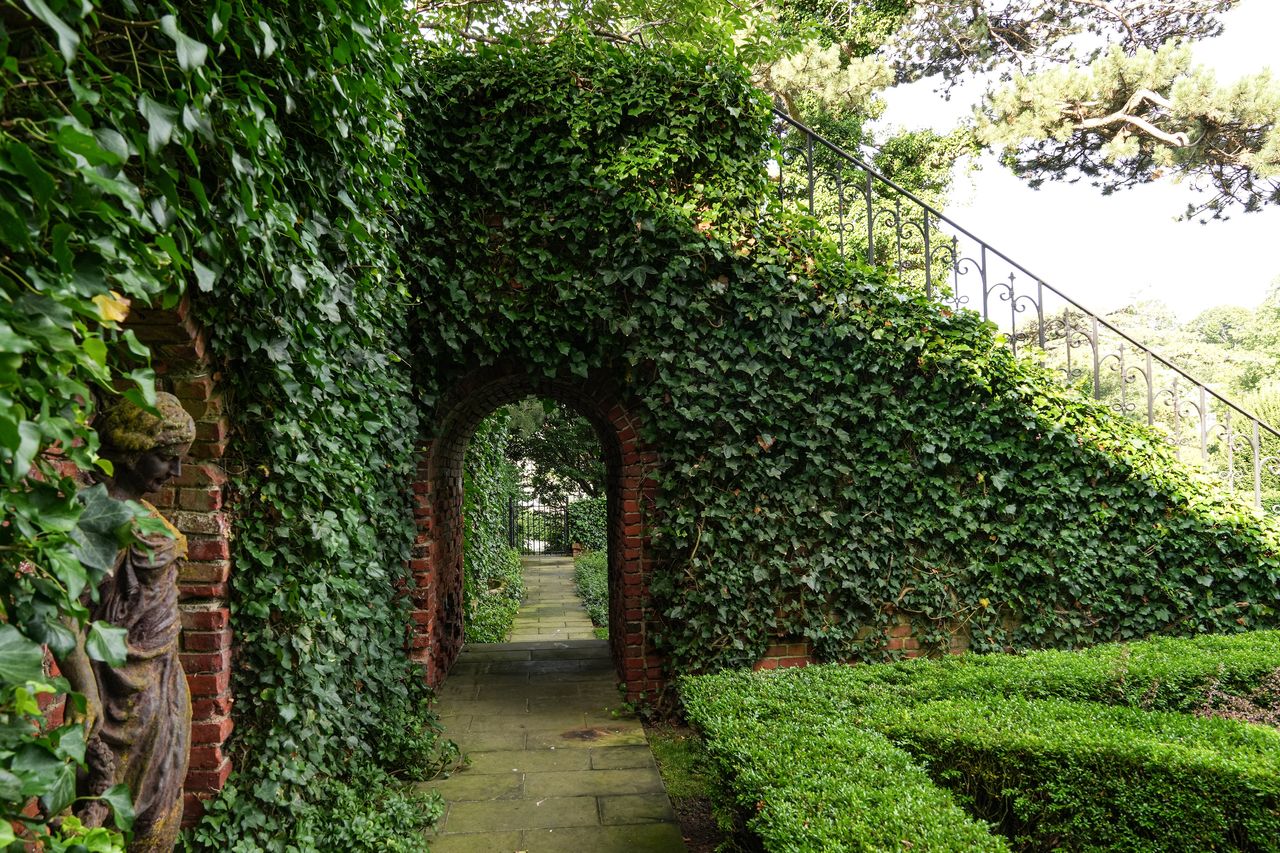How to Add Gilded Age Glamour To Any Backyard
The restoration of a grand New England garden offers lessons for growers who are eager to add ‘instant age’ to modern-day plots.
WHEN WE BEGAN, it was basically an archaeological ruin,” landscape architect Douglas Jones recalled of the elegant Marblehead, Mass., garden that his client, Brian McCarthy, has dedicated two decades to reviving. In the late 1990s, when the McCarthys purchased the waterfront parcel, which included portions of a turn-of-the-century summer estate once owned by heiress and historical preservationist Louise du Pont Crowninshield, their focus was building a home for their growing family—not planting hedges and training roses. But after neighbours shared 1930s photos of the Italianate garden at its peak, the challenge of making a new version look as if it had been there for more than a century proved irresistible. “I wanted to embrace the history,” said Mr. McCarthy.
Guided by that mission, Mr. Jones, of the Boston firm LeBlanc Jones Landscape Architects, launched a “conjectural restoration,” informed by remnants of railings, walls and garden beds. Mr. McCarthy, an avid auction-goer, stalked period statuary. “At a certain point, we had to invent,” said Mr. Jones. “But we were always faithful to the spirit of the place.”
The result is a welcoming garden that looks as if it has always been there—and always will. Here, five strategies that can help homeowners add historical character to their own backyards, no blue-blood pedigree required.
1. Embrace Reclaimed Materials
Though brickwork walls were one of the original features of the garden when Mr. McCarthy hired Mr. Jones to take on the property, the structures were in various states of disrepair, ranging from bad to worse. The solution for an age-appropriate fix: hiring masons to rebuild and repair stairways, walls, niches and arches using a mix of original materials and reclaimed Chicago common bricks sourced to complement the old ones. “Afterward everything was sandblasted to give it a unified, weathered look,” Mr. Jones explained. A creeping blanket of English ivy also helps tie old and new together. “A masonry consultant would definitely tell you to pull off these vines,” he said. “But we love how they add a sense of age, so we’ve allowed them to envelop.”
2. Traffic in Traditional Motifs
For a garden that looks timeless, stick to designs that never go out of style. Topiaries and manicured hedges with well-defined edges are a classic motif in formal gardens and an ideal way to imbue otherwise bland spaces with structure and a sense of history. Here, Mr. Jones used an allée of pyramidal Japanese yews to create a linear transition between the rose garden and the looser, perennial plantings that abut the pool and greenhouse. “It’s a complete invention but in keeping with the old garden,” he explained. Feathery pink astilbe, added by gardener Rick Elder, brings a soft, organic note to the corridor, and in the distance, a 150-year-old bronze beech forms a majestic backdrop behind a sweet marble statue of a child.
3. Seek Out Antique Varietals
The rose garden was one of the most well-documented elements of the original plan, with copious photographs and remnants of the beds visible on the ground. But its restoration was also aided by serendipity: “Amazingly, we found a label for some old roses buried in the soil,” said Mr. Jones—info that was confirmed by an elderly gardener who had worked on the estate more than half a century before. True to the past, Mr. Jones used that varietal—Iceberg, a floribunda prized for cloudlike blossoms—for the perimeter of the garden, then filled in using fragrant newer cultivars from renowned British breeder David Austin Roses, such as Glamis Castle and Abraham Darby, in a pale palette of pink and white.
4. Splurge On Mature Plants
Don’t discount the power of a head start. To lend the grounds instant age, in among younger specimens Mr. Jones planted dozens of established shrubs and trees. Some of Mr. McCarthy’s favourites: the sprawling wisteria that cascades over the waterfront porch of the family’s newly built (but historically-accurate) Georgian home. They were decades old when purchased—”and they might be a hundred now,” said Mr. McCarthy. Trained and nurtured since, the vines drape to create a keyhole vista of Marblehead harbour. “These have really been a labour of love,” said Mr. Jones.
5. Drop in Pieces With Patina
Arranged everywhere throughout the garden, in niches and clearings, is the sculptural evidence of Mr. McCarthy’s keen collector’s eye. In a less grand garden the objects might look out of place, said Mr. Jones. “But they really work here.” Among the most striking pieces: figures in bronze and cast-iron that react with the elements to form a warm, coppery patina. “I love the way the colouring looks against the brick,” Mr. McCarthy said. “These aren’t the kind of things you’re going to go to Home Depot and see—you’ll never find another one,” he added. “Antiques give the garden the mystique it needs.”
Reprinted by permission of Mansion Global, Copyright 2021 Dow Jones & Company. Inc. All Rights Reserved Worldwide. Original date of publication: August 17, 2022.
 Copyright 2020, Dow Jones & Company, Inc. All Rights Reserved Worldwide. LEARN MORE
Copyright 2020, Dow Jones & Company, Inc. All Rights Reserved Worldwide. LEARN MORE
This stylish family home combines a classic palette and finishes with a flexible floorplan
Just 55 minutes from Sydney, make this your creative getaway located in the majestic Hawkesbury region.
As Paris makes its final preparations for the Olympic games, its residents are busy with their own—packing their suitcases, confirming their reservations, and getting out of town.
Worried about the hordes of crowds and overall chaos the Olympics could bring, Parisians are fleeing the city in droves and inundating resort cities around the country. Hotels and holiday rentals in some of France’s most popular vacation destinations—from the French Riviera in the south to the beaches of Normandy in the north—say they are expecting massive crowds this year in advance of the Olympics. The games will run from July 26-Aug. 1.
“It’s already a major holiday season for us, and beyond that, we have the Olympics,” says Stéphane Personeni, general manager of the Lily of the Valley hotel in Saint Tropez. “People began booking early this year.”
Personeni’s hotel typically has no issues filling its rooms each summer—by May of each year, the luxury hotel typically finds itself completely booked out for the months of July and August. But this year, the 53-room hotel began filling up for summer reservations in February.
“We told our regular guests that everything—hotels, apartments, villas—are going to be hard to find this summer,” Personeni says. His neighbours around Saint Tropez say they’re similarly booked up.
As of March, the online marketplace Gens de Confiance (“Trusted People”), saw a 50% increase in reservations from Parisians seeking vacation rentals outside the capital during the Olympics.
Already, August is a popular vacation time for the French. With a minimum of five weeks of vacation mandated by law, many decide to take the entire month off, renting out villas in beachside destinations for longer periods.
But beyond the typical August travel, the Olympics are having a real impact, says Bertille Marchal, a spokesperson for Gens de Confiance.
“We’ve seen nearly three times more reservations for the dates of the Olympics than the following two weeks,” Marchal says. “The increase is definitely linked to the Olympic Games.”

Getty Images
According to the site, the most sought-out vacation destinations are Morbihan and Loire-Atlantique, a seaside region in the northwest; le Var, a coastal area within the southeast of France along the Côte d’Azur; and the island of Corsica in the Mediterranean.
Meanwhile, the Olympics haven’t necessarily been a boon to foreign tourism in the country. Many tourists who might have otherwise come to France are avoiding it this year in favour of other European capitals. In Paris, demand for stays at high-end hotels has collapsed, with bookings down 50% in July compared to last year, according to UMIH Prestige, which represents hotels charging at least €800 ($865) a night for rooms.
Earlier this year, high-end restaurants and concierges said the Olympics might even be an opportunity to score a hard-get-seat at the city’s fine dining.
In the Occitanie region in southwest France, the overall number of reservations this summer hasn’t changed much from last year, says Vincent Gare, president of the regional tourism committee there.
“But looking further at the numbers, we do see an increase in the clientele coming from the Paris region,” Gare told Le Figaro, noting that the increase in reservations has fallen directly on the dates of the Olympic games.
Michel Barré, a retiree living in Paris’s Le Marais neighbourhood, is one of those opting for the beach rather than the opening ceremony. In January, he booked a stay in Normandy for two weeks.
“Even though it’s a major European capital, Paris is still a small city—it’s a massive effort to host all of these events,” Barré says. “The Olympics are going to be a mess.”
More than anything, he just wants some calm after an event-filled summer in Paris, which just before the Olympics experienced the drama of a snap election called by Macron.
“It’s been a hectic summer here,” he says.

AFP via Getty Images
Parisians—Barré included—feel that the city, by over-catering to its tourists, is driving out many residents.
Parts of the Seine—usually one of the most popular summertime hangout spots —have been closed off for weeks as the city installs bleachers and Olympics signage. In certain neighbourhoods, residents will need to scan a QR code with police to access their own apartments. And from the Olympics to Sept. 8, Paris is nearly doubling the price of transit tickets from €2.15 to €4 per ride.
The city’s clear willingness to capitalise on its tourists has motivated some residents to do the same. In March, the number of active Airbnb listings in Paris reached an all-time high as hosts rushed to list their apartments. Listings grew 40% from the same time last year, according to the company.
With their regular clients taking off, Parisian restaurants and merchants are complaining that business is down.
“Are there any Parisians left in Paris?” Alaine Fontaine, president of the restaurant industry association, told the radio station Franceinfo on Sunday. “For the last three weeks, there haven’t been any here.”
Still, for all the talk of those leaving, there are plenty who have decided to stick around.
Jay Swanson, an American expat and YouTuber, can’t imagine leaving during the Olympics—he secured his tickets to see ping pong and volleyball last year. He’s also less concerned about the crowds and road closures than others, having just put together a series of videos explaining how to navigate Paris during the games.
“It’s been 100 years since the Games came to Paris; when else will we get a chance to host the world like this?” Swanson says. “So many Parisians are leaving and tourism is down, so not only will it be quiet but the only people left will be here for a party.”
This stylish family home combines a classic palette and finishes with a flexible floorplan
Just 55 minutes from Sydney, make this your creative getaway located in the majestic Hawkesbury region.






















